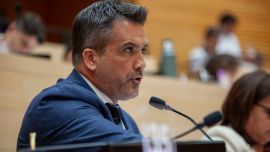Writing for the El Cohete a la Luna website last year, former Central Bank official Sebastian Soler wrote that the “ground zero” of the financial crisis engulfing Argentina is not Hipólito Yrigoyen 250, the headquarters of Finance Ministry in Buenos Aires. Nor is it Reconquista 266, the home of the Central Bank, he added. “Ground zero,” he said, is 25 de Mayo 550 in Rawson, at the Economic Ministry of Chubut Province.
A stretch of Patagonian landscape stretching from Chile to the Atlantic Ocean, Chubut faces a profound social and economic crisis. Driven by crushing provincial debt and economic mismanagement, public workers in Chubut are facing a second so-called “staggered pay” situation in two years. Since August, education, health and court workers have either not been paid in full or been paid via a convoluted quota system.
Those earning 40,000 pesos (roughly US$663) are paid in the first week of the month. Those paid up to 65,000 (US$1,078) pesos are paid the next week, and so on. Yet just like the expectations set by Chubut’s politicians, the system constantly changes. The province now pays workers in four income brackets. Last month, salaries were paid in three. Before that, there were two.
Provincial labour unions reject any “staggered pay” options outright, demanding all current and owed salaries be paid immediately.
In August, Chubut Governor Mariano Arcioni and provincial Economic Minister Oscar Antonena predicted that the “staggered pay” crisis would last for six months. The following day, Arcioni and his advisors saddled the region with another one billion pesos in public debt to alleviate the crisis.
“This situation is extremely sensitive,” Antonena told reporters in August. “When a moment of change comes, we’ll announce it.”
Antonena did not respond to multiple requests for comment.
In the first half of 2019, Chubut spent 22 million on public worker salaries, a quarter of its public budget, according to figures from Facundo Ball, an economist at the National University of Patagonia.
In an interview with local outlet Crónica, Ball pointed to salary increases for public workers in recent years, describing them as unsustainable and blaming the provincial government’s mismanagement of public funds.
“It’s certain that these salary increases were necessary,” Ball said in August. “Yet you have to ask if it was possible… the government clearly knew it was not going to sustain this salary increase.”
Roughly 7.5 percent of Chubut’s residents are public workers, far lower than fellow provinces in Patagonia, like Neuquén (10 percent), Santa Cruz (11.1 percent) and Río Negro (9.3 percent), according to data from the Finance Ministry.
CRISIS AND DESPAIR
The economic despair and sense of crisis runs deeper than pay shortages for public workers. Despite enormous wealth in oil reserves, wind energy, fishing and aluminum industries, for many in Chubut, this wealth never trickles down to the population.
“This has been a question that mobilises the people of Patagonia, particularly in Chubut, because this kind of life always produces injustices,” said Gonzalo Pérez Álvarez, a history professor at the National University of Patagonia.
Chubut has always been oil country. State oil company YPF was founded in the southern hub of Comodoro Rivadavia in 1922.
Álvarez argues that two important moments in the history of Chubut’s oil industry plunged the province into its current crisis. After the privatisation of YPF in the 1990s, the authorities conceded large amounts of oil in an agreement with Pan American Energy, a multinational energy company owned by wealthy Argentine family the Bulgheronis, the professor argued. Negotiated in 2007, the agreement caused Chubut’s oil revenues to plunge, and barred its government from renegotiating the deal for 40 years.
“This really fractured our province,” Álvarez said. “Pan American Energy is a fundamental part of the crisis.”
Faced with a fall in global oil prices in 2013, the government began to incur debt to compensate for depleted revenues. More debt was taken out to cover existing debt. Today, Chubut’s provincial debt stands at nearly US$1 billion.
For the local government, 21 percent of its income comes from taxes levied on the export of oil. Yet 70 percent of all these precious oil revenues go towards paying off debt, according to local media reports.
DEBT-FINANCING
For the province, 86 percent its public debt is expressed in dollars, the third-highest amount in the country, according to BAE Negocios.
With greater and greater devaluations of the peso, Chubut has become less able to service its dollarised debt. Currently it services it through three yearly payments estimated at US$30 million each, according to the provincial Economy Ministry.
Nearly 90 percent of Chubut’s debt is comprised of government bonds which mature in 2026. Yet faced with the province’s ongoing economic meltdown, Governor Mariano Arcioni and his aides have floated extending these deadlines and issuing more promissory notes to creditors.
The anatomy of the province further explains much of the outrage felt by teachers experiencing lack of pay.
Some US$300-million of the debt was taken out in 2016 to pay off already existing debts taken out by the government of former governor Mariano Das Neves, who died in office in 2017 and was succeeded by Arcioni.
The government claims another US$250 million of debt went to public works projects, which the government never carried out.
“They don’t know where this money went,” said Belén Branchi, a lawyer and anti-mega mining activist in Chubut, alleging that it likely “went into the pockets of those who hold positions in government.”
Arcioni won re-election in June with only 38 percent of the vote and faced no run-off, yet only 70 percent of eligible voters participated and another 11 percent of votes were left blank. Despite lingering allegations corruption, Arcioni campaigned on ensuring all salaries to public workers. Weeks after his primary win, Arcioni announced a new “staggered pay” crisis nevertheless.
“By July they already didn’t have the money to pay salaries,” said Álvarez of the National University of Patagonia. “This created a sensation of outrage, of injustice, a sensation of being cheated for the population of Chubut.”
ANGER
The constant presence of corruption and theft by public officials generates only more anger for the residents of the oil-rich province. Earlier this month, 12 former government officials and businessmen were found guilty in a massive corruption trial.
Two uncertainties now hang over Chubut’s crisis. Despite a law prohibiting the introduction of mega-mining in Chubut, the mining industry has long offered itself as a solution to Chubut’s repeating economic panics. Activists in Chubut think the crisis will be again used to justify the extraction of the province’s silver reserves.
During his tenure, Arcioni has relied on a friendly alliance with President Mauricio Macri. Yet with Peronist Alberto Fernández likely to take victory in this month’s general elections, Arcioni has made new inroads with key figures.
Arcioni has travelled to meetings of the country’s Peronist governors in his private jet, and has met with Fernández and Sergio Massa, a leading figure in Fernández’s Frente de Todos coalition and close friend of Chubut’s governor. Earlier this week, Arcioni and his party, Chubut al Frente, suspended the campaigns of their national deputy candidates and threw all their support behind the candidates of Frente de Todos.
When asked by a reporter Fernández about Chubut’s crisis earlier this month, the presidential favourite replied: “I don’t know exactly. I don’t want to speculate about what’s happening in Chubut.”
“But where things have to be organised they will be organised,” Fernández said.
* This story would not be possible without the selfless help, contacts and time of three journalists in Chubut. Their names are Julieta Lucero of Revista Cítrica, Fabricio Cardelli of Revista Cítrica and Radio Namunkurá 88.9 and Martín Berrade of Canal 7. These journalists dedicate their lives to covering the extraordinary province of Chubut. The journalist who wrote this article article is forever grateful to them.


























Comments